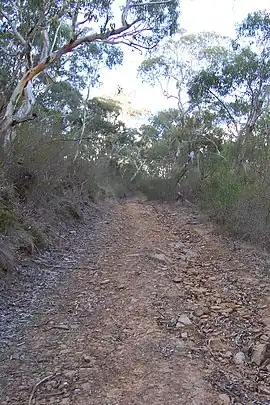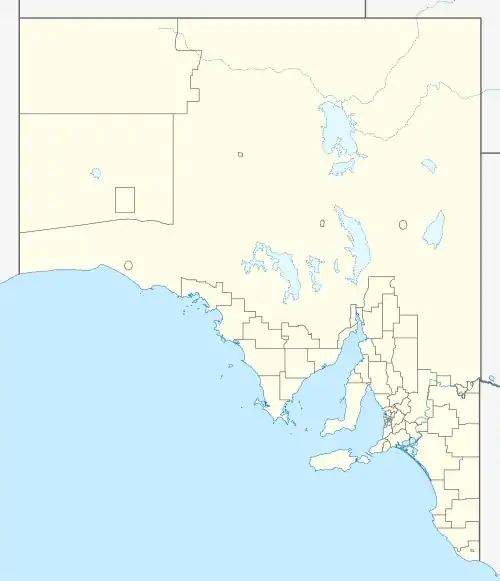Finniss Conservation Park
Finniss Conservation Park is a protected area in the Australian state of South Australia located in the Mount Lofty Ranges about 43 kilometres (27 miles) south of the state capital of Adelaide and about 7 kilometres (4.3 miles) west of Ashbourne. It is located within the gazetted locality of Mount Magnificent.[2][5]
| Finniss Conservation Park South Australia | |
|---|---|
 Finniss in Easter 2007 | |
 Finniss Conservation Park | |
| Nearest town or city | Ashbourne[2] |
| Coordinates | 35°18′57″S 138°41′42″E[1] |
| Established | 29 January 1976[3] |
| Area | 1.23 km2 (0.5 sq mi)[4] |
| Managing authorities | Department for Environment and Water |
| See also | Protected areas of South Australia |
The conservation park consists of the following land in the cadastral unit of the Hundred of Kondoparinga - "Allotment 22 of DP 63695" and sections 107, 108 and 1963. It came into existence on 29 January 1976 by proclamation under the National Parks and Wildlife Act 1972 in respect to section 1963. Land in sections 107 and 108 was added on 28 November 1985 and land in Allotment 22 was added on 23 June 2005.[3][6][7] As of 2018, it covered an area of 1.23 square kilometres (0.47 sq mi).[4]
The Heysen Trail, the long distance walking trail, passes along the west side of the conservation park from Ridge Road in the south to Mount Magnificent Road in the north.[8][2]
In 1980, the conservation park was described as follows:[5]
A small park preserving a natural remnant of the open forest and scrub associations representative of the region, including one of the best preserved areas of Eucalyptus cosmophylla scrub in the South Mount Lofty Ranges. The park includes crest, slope and valley floor associations and affords good views of the coast...
A high rocky plateau and south trending ridges with steep intervening valleys, including a short stretch of the Finniss River. The western end of the Park consists of E. leucoxylon/E. fasciculosa woodland over regenerating pasture. The eastern end includes the plateau and is vegetated by very dense, spectacular scrub of E. cosmophylla, Hakea prostrata, Hulcina, Allocasuarina muelleriana, Leptospermum juniperinum and Tetratheca pilosa...
The western end has been semi-cleared and grazed, however the E. Cosmophyla scrub is essentially undisturbed. This scrub area is contiguous with scrub to the east and north-east of the park.
The conservation park is classified as an IUCN Category III protected area.[1] In 1980, it was listed on the now-defunct Register of the National Estate.[5]
References
- "Terrestrial Protected Areas of South Australia (refer 'DETAIL' tab )". CAPAD 2016. Australian Government, Department of the Environment (DoE). 2016. Retrieved 21 February 2018.
- "Search results for 'Finniss Conservation Park' with the following datasets selected – 'Suburbs and Localities', 'NPW and Conservation Properties', 'Hundreds', 'Roads', 'Recreational Trails' and 'Gazetteer'". South Australian Government. Retrieved 8 July 2018.
- Banfield, D.H. (29 January 1976). "NATIONAL PARKS AND WILDLIFE ACT, 1972-1974: FINNISS CONSERVATION PARK CONSTITUTED" (PDF). The South Australian Government Government. South Australian Government. p. 354. Retrieved 7 July 2018.
- "Protected Areas Information System Reserve List" (PDF). Government of South Australia. 9 March 2018. Retrieved 26 April 2018.
- "Finniss Conservation Park - listing on the now-defunct Register of the National Estate (Place ID 6618)". Australian Heritage Database. Australian Government. 21 October 1980. Retrieved 7 July 2018.
- Cornwall, J.R. (28 November 1985). "NATIONAL PARKS AND WILDLIFE ACT, 1972: SECTION 30 FINNISS CONSERVATION PARK—ALTERATION OF BOUNDARIES" (PDF). The South Australian Government Gazette. South Australian Government. p. 1608. Retrieved 7 July 2018.
- "National Parks and Wildlife (Finniss Conservation Park) Proclamation 2005". The South Australian Government Gazette. South Australian Government. 23 June 2005. p. 1903. Retrieved 7 July 2018.
- "Section 10: Kyeema to Dashwood Gully". The Heysen Trail. The Friends of the Heysen Trail and Other Walking Trails Inc. Retrieved 8 July 2018.
 This article incorporates text by Commonwealth of Australia available under the CC BY 3.0 AU licence.
This article incorporates text by Commonwealth of Australia available under the CC BY 3.0 AU licence.